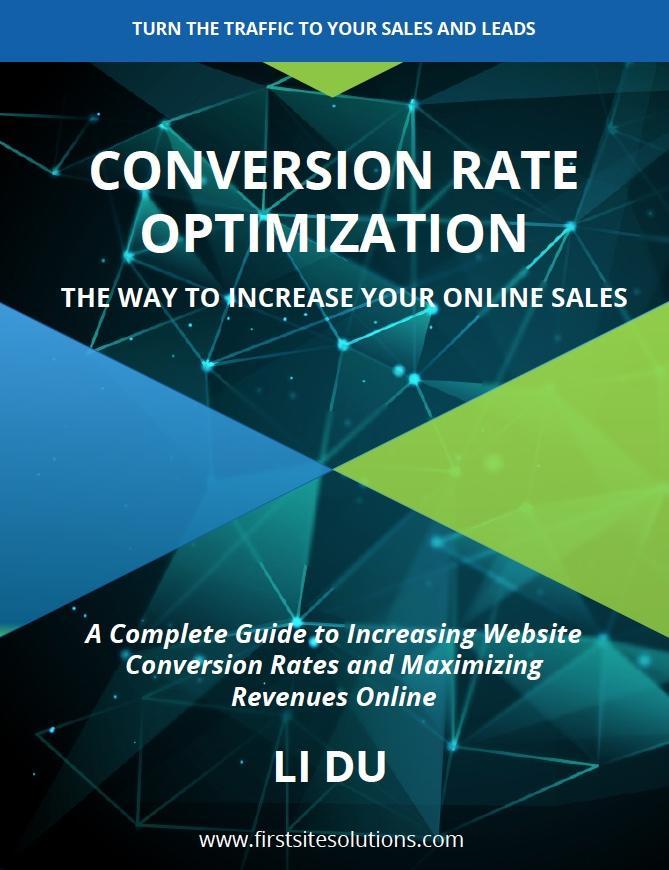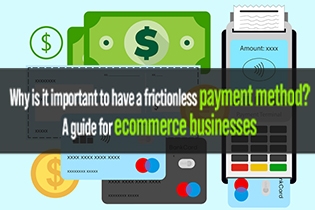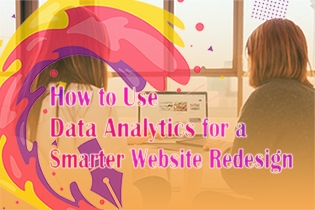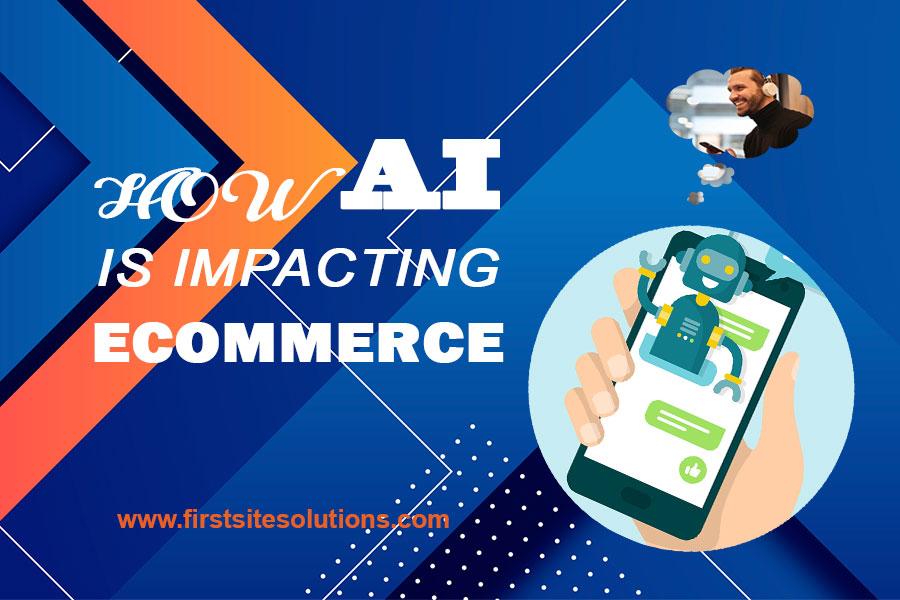
Artificial Intelligence (AI) and machine learning is no more an unheard concept. AI is everywhere now and is slowly taking over routine jobs from human beings. Digital marketers and businesses are implementing AI to improve their rankings, increase sales revenue, and cut operational costs at the same time. AI is placing itself in almost every aspect of our life. Back in the 2000s, who would have thought of controlling their home appliances using Amazon Echo or Google Home?
With tremendous growth and influence in several industries, you might also have firsthand experience of the changes AI brought to the E-commerce world. AI is transforming the way shoppers connect with sellers by suggesting products based on their interest and search history. Moreover, this technology helps in regulating several operations, such as targeting potential customers, warehouse automation, and predicting future sales. With continuous improvements in machine learning and analyzing human behavior, AI has a lot to offer to the E-commerce industry.
1. Assistants and Chatbots
E-commerce websites now offer a 24/7 live assistant, thanks to chatbots. The feature often appears on the lower end of your website’s page or mobile application. Chatbots are AI-based programs that communicate with shoppers in an engaging tone, similar to humans. They have a bank of custom replies and can resolve several general queries a visitor has during online shopping.

Chatbots are also bridging the gap between sellers and buyers as they can recommend products and influence a user’s decisions. They are also helpful for product comparison and can escalate your query to relevant support personnel.
While this improves the shopping experience for customers, Chatbots still have a long way to go with regards to machine learning. A majority of Chatbots can’t communicate and understand a user’s query. Rather, they match the questions with a pre-defined set of answers from the database.
MobileMonkey is a super Chatbots Platform at the cutting edge of AI Chatbots and marketing automation. MobileMonkey’s chatbots have advanced Bot Building function, enable marketers to engage with customers, grow and segment audience, send drip campaigns and chat blasts, and a lot more.
2. Sales Forecasting and Growth
E- AI can assist the customers in the entire online shopping process, from finding the right product to paying for their purchase. Besides, AI can generate results based on segmentation and can break down sales figures into different demographics, including gender and geographical regions, helping businesses optimize their resource allocation.
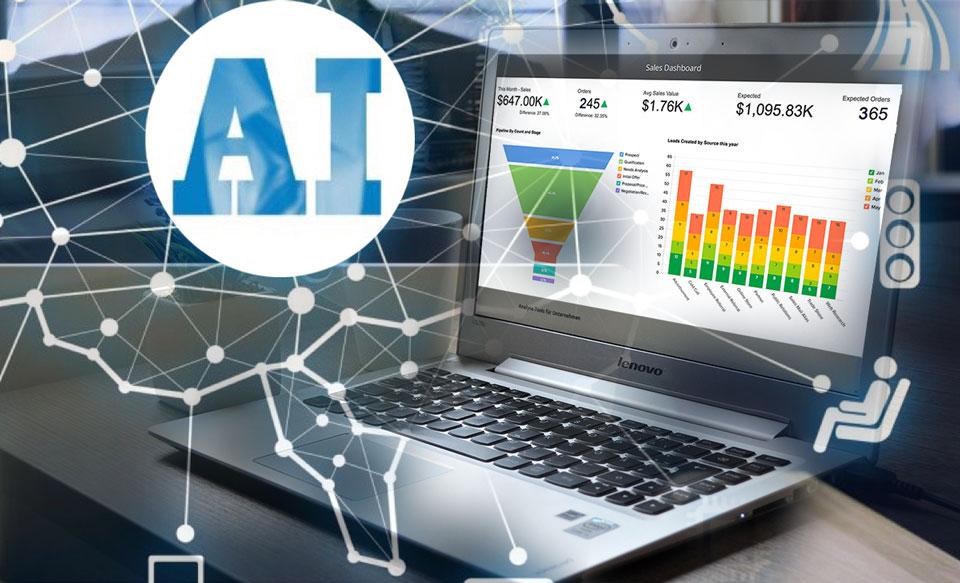
Another significant factor for AI in E-commerce is sales forecasting. If an employee goes through all the sales data to prepare a sales forecast report, the process will be time-consuming. AI does all of that by analyzing big volumes of information and can record large inventory turnover without human intervention. Machine learning is further able to analyze the data and compare it with historical trends. The process will result in a better and automated sales forecasting, helping businesses plan accordingly.
3. Recommendations and Retargeting Customers
Almost all retailers deploy the recommendation feature on their product pages. This feature helps them identify and target potential customers. When a shopper searches about a product on any E-commerce retail store, the website will store his/her data on the backend. This information helps AI tools to analyze the customer’s behavior based on search history and recommend similar products on the top level and inner pages.
Additionally, the recommendation feature also helps e-commerce businesses with retargeting. Reselling similar products or their add-ons is a key force for driving additional sales. With AI, sellers in E-commerce industry can highlight their products on top of the user dashboard.
4. Inventory Management and Warehouse Automation
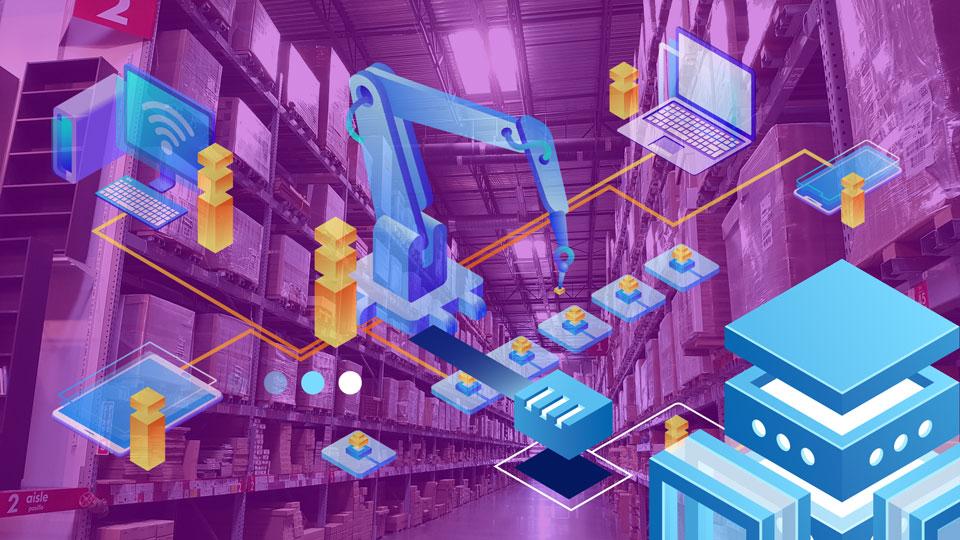
Inventory management is a crucial part of every business. Nobody wants to go out of stock during peak hours. Besides, retailers are also skeptical when it comes to stockpiling inventory as it can increase their holding cost and the risk of damages.
Every business needs to maintain adequate inventory levels. Using the e-commerce platform can make this a complex tax, especially if there is no tool to link online sales with inventory records. AI applications can alert businesses when their inventory is below a certain threshold and can help to ascertain the changing demand patterns. Businesses can reduce their operational costs, without requiring any staff to keep track of inventory levels.
Artificial intelligence also goes a step ahead by providing warehouse automation to E-commerce businesses. Managing warehousing operations effectively is significant for every online business. Retailers can ensure quick delivery of products, which contributes to a positive brand image. AI helps automate the process of packaging, and categorizing products, in turn, speeding up the efficiency and improving the delivery mechanism.
5. Filtering Fake Reviews
As per a Dimensional Research report from 2013, 90% of the participants acknowledged the fact that positive reviews influence their buying decisions. However, we all know that fake reviews are widespread within the E-commerce industry. Fake review has become a common problem for online retailers, even E-commerce giants like Amazon and eBay, and it is hurting both sellers and buyers.
There is a perception that sellers tend to use these underhand tactics to beat the competition or increase their chances for capturing a greater market share. While many consumers complain about fake positive reviews that misrepresent products or services and mislead them to make wrong purchasing decision, business owners all condemn fake negative reviews, because extreme low-star reviews truly hurt sales and undermine the credibility of a business.
The BrightLocal’s Local Consumer Review Survey on Trust and Influence uncovered how online reviews influence consumers’ decision on whether or not using a local business as below:
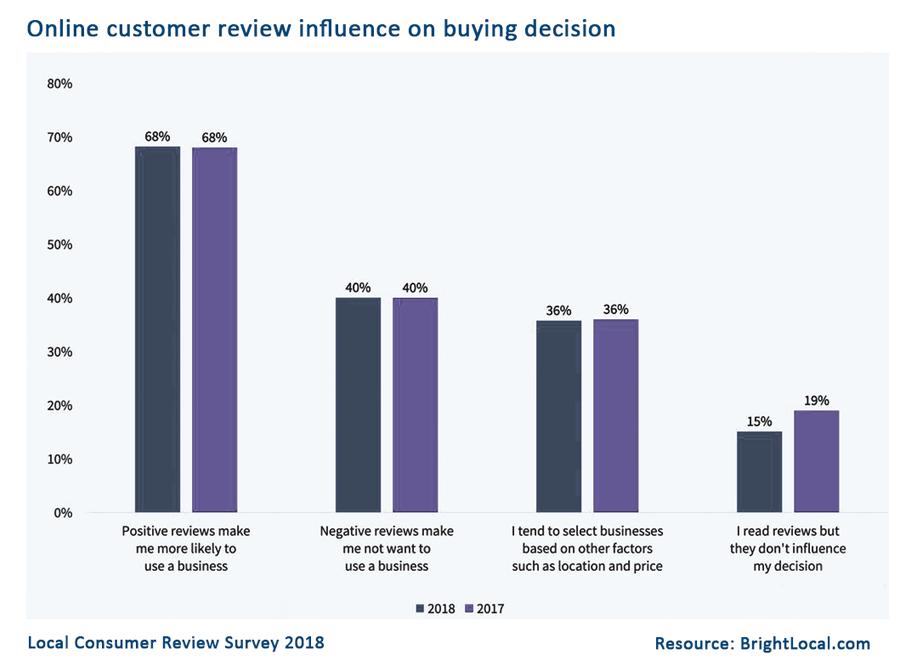
The chart shows that majority consumers are influenced by reviews, and 40% of consumers stop wanting use a business after reading the negative reviews. The change in the survey results over 2 years is little.
AI helps businesses manage this problem by fighting auto-surfing and posting methods and putting emphasis on helpful and verified reviews. Moreover, the technology can help you combat fake reviews effectively and deflate the artificial popularity of the product using complex machine learning.
Conclusion
AI will continue improving down the line, as more and more business are adapting to machine learning. Same is the case with the E-commerce industry, although the situation is still far from perfect. AI tools are becoming widespread, and many small and large E-commerce platforms are deploying them on their platform to influence customer retention, choices, and satisfaction. AI is definitely impacting the E-commerce industry. The scalability and use of AI applications will only increase in the future.


